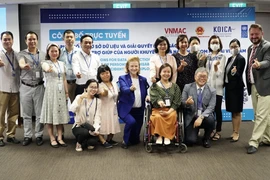See more

Deputy PM hosts Nicaraguan, Algerian guests
Nicaragua’s Foreign Minister Valdrack Jaentschke and Algeria’s Minister Mujahedeen and Rights Holders Laid Rebiga are in Vietnam to attend the celebration of the 50th anniversary of the Liberation of the South and National Reunification.
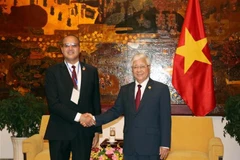
Vietnam, Algeria promote traditional relations
During the meeting, the two sides agreed to consolidate and promote traditional relations through promoting delegation exchanges to increase political trust, enhance mutual understanding, inherit and promote the good legacy in the bilateral relationship.

CPV strengthens ties with Latin American left-wing parties
Secretary of the Communist Party of Vietnam (Central Committee and Chief of the committee’s Office Le Hoai Trung welcomed officials of the United Socialist Party of Venezuela and the United Left Movement (MIU) Party of the Dominican Republic, who are in Vietnam for the ceremony marking the 50th anniversary of the liberation of the South and national reunification.

Vietnam works together with int’l community to build a future of peace, prosperity, solidarity, development
Before, during and after the signing of the Paris Peace Accords in 1973, socialist countries, and peace-loving, justice-loving and progressive people around the world gave effective support, assistance and aid for, and stood side by side with the Vietnamese people in this just struggle.

Cuba honours Vietnam’s April 30 victory
April 30, 1975 was one of the great events of the 20th century and a typical example of resilience, struggle and victory for all peoples in the world.

PM suggests Vietnam, Tanzania regard economic cooperation as central focus
Prime Minister Pham Minh Chinh suggested Tanzania soon open its embassy in Vietnam and called for joint efforts in negotiating and signing a free trade agreement.

Party leader meets with Cuban Vice President in HCM City
The Party chief emphasised that Vietnam always treasures and remembers the solidarity and sincere support, both spiritual and material, that Cuba has given Vietnam in the past struggle for national liberation and reunification, as well as in the current cause of national defence and construction.
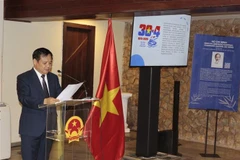
Gathering held in Brazil to mark Vietnam’s national reunification anniversary
He also reviewed Vietnam’s remarkable achievements over the past 50 years since its national reunification and nearly 40 years of Doi moi (renewal), noting the country’s transformation from a war-ravaged nation into a dynamic and responsible member of the international community.

Grand parade celebrates 50 years of liberation of South, national reunification
A grand parade in celebration of the 50th anniversary of the Liberation of the South and National Reunification (April 30, 1975-2025) was held solemnly and impressively in Ho Chi Minh City’s District 1 on April 30 morning, with the participation of more than 13,000 people.

Top legislator pays respect to late predecessor
National Assembly (NA) Chairman Tran Thanh Man expressed his profound gratitude for late NA Chairman Nguyen Huu Tho's great contributions to the revolutionary cause of the Party, the country, and the NA.

Foreign ambassadors congratulate Vietnam’s achievements after 50 years of reunification
The April 30, 1975 victory was a symbol of ardent patriotism, the strength of great national unity, the indomitable and heroic fighting spirit of the Vietnamese army and people, and the strong aspiration of the Vietnamese people for independence, freedom, peace and happiness.

UN University for Peace Ambassador highlights Vietnam’s peace building efforts
Puyana acknowledged that the victory on April 30, 1975 was a significant milestone in the country's history, as well as for the world during that period, as it marked a day of reunification for the Vietnamese people and demonstrated the importance of the efforts made by President Ho Chi Minh and other Vietnamese leaders.

April 30 victory praised as a triumph of solidarity, revolutionary heroism under CPV's leadership
He noted that the triumph of the Vietnamese people in their resistance war against the US imperialists marked a historic turning point in the global struggle for liberation and signified a decisive defeat for imperialism and colonialism.

Vietnam’s historic April 30 victory – a testament to revolutionary heroism: Argentine media
April 30 remains a golden milestone in Vietnam’s history, embodying patriotism, resilience, and a desire for freedom and independence. It is also a symbol of solidarity and a triumph of the collective strength of the Vietnamese people under the sound leadership of the Communist Party of Vietnam

Vietnam undergoes tremendous changes, affirms international position: Russian expert
Vietnam is not only a comprehensive strategic partner of Russia, but also one of the top three countries that Russia can always trust, he said.
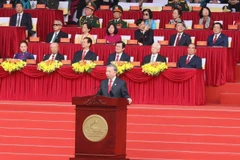
Party chief's address at national celebration of liberation of South and national reunification
General Secretary of the Central Committee of the Communist Party of Vietnam (CPV) To Lam delivered an address at the national celebration of the 50th anniversary of the liberation of the South and national reunification held in Ho Chi Minh City on April 30.

With its mettle, wisdom and strength, Vietnam continues to create miracles in new era: Party chief
Party General Secretary To Lam said with a burning desire to safeguard national independence and reunification, and with the spirit of "Nothing is more precious than independence and freedom", the entire Vietnamese people, from Nam Quan Pass to Ca Mau Cape, united to repel the invaders and everywhere marked the bravery, sacrifices and glorious feats of the army and people.

Vietnamese troops prepare for historic march at Russia’s Victory Day parade
A Vietnamese delegation comprising 80 members, including 68 cadets from the Army Officer Training School No.1 is in Moscow to attend the Victory Day parade marking the 80th anniversary of the Great Patriotic War triumph.

Grand parade marks 50 years of liberation of South and national reunification
A national ceremony and parade will be held on April 30 morning in Ho Chi Minh City to celebrate the 50th anniversary of the Liberation of the South and National Reunification (April 30, 1975 – 2025).
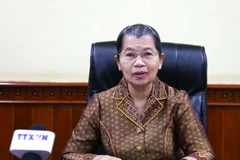
Cambodia prioritises preserving traditional friendship with Vietnam: Cambodian official
CPP President and Senate President Hun Sen will visit Vietnam to attend the grand ceremony celebrating the country’s 50th anniversary of the liberation of the South and national reunification on April 29–30.







